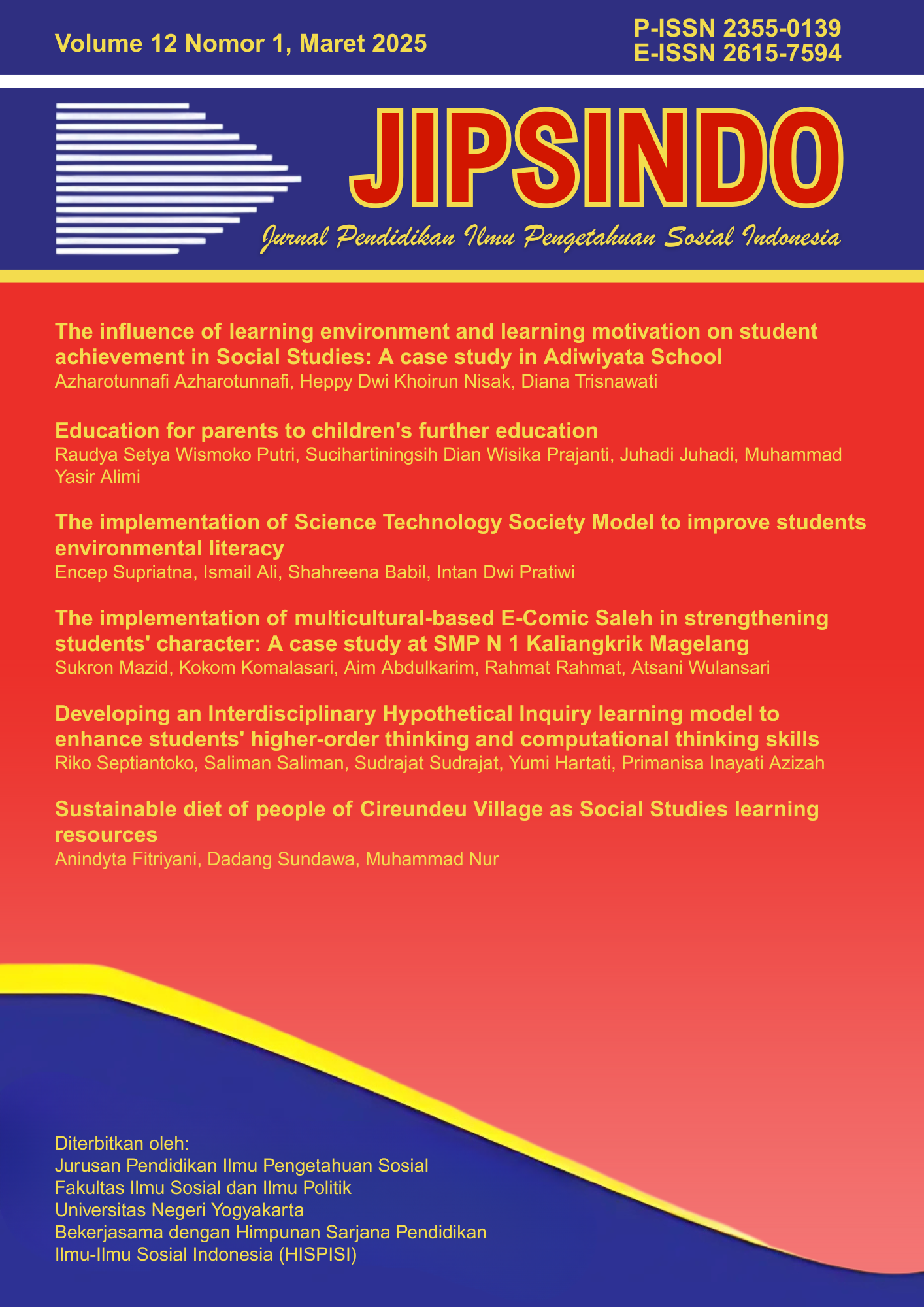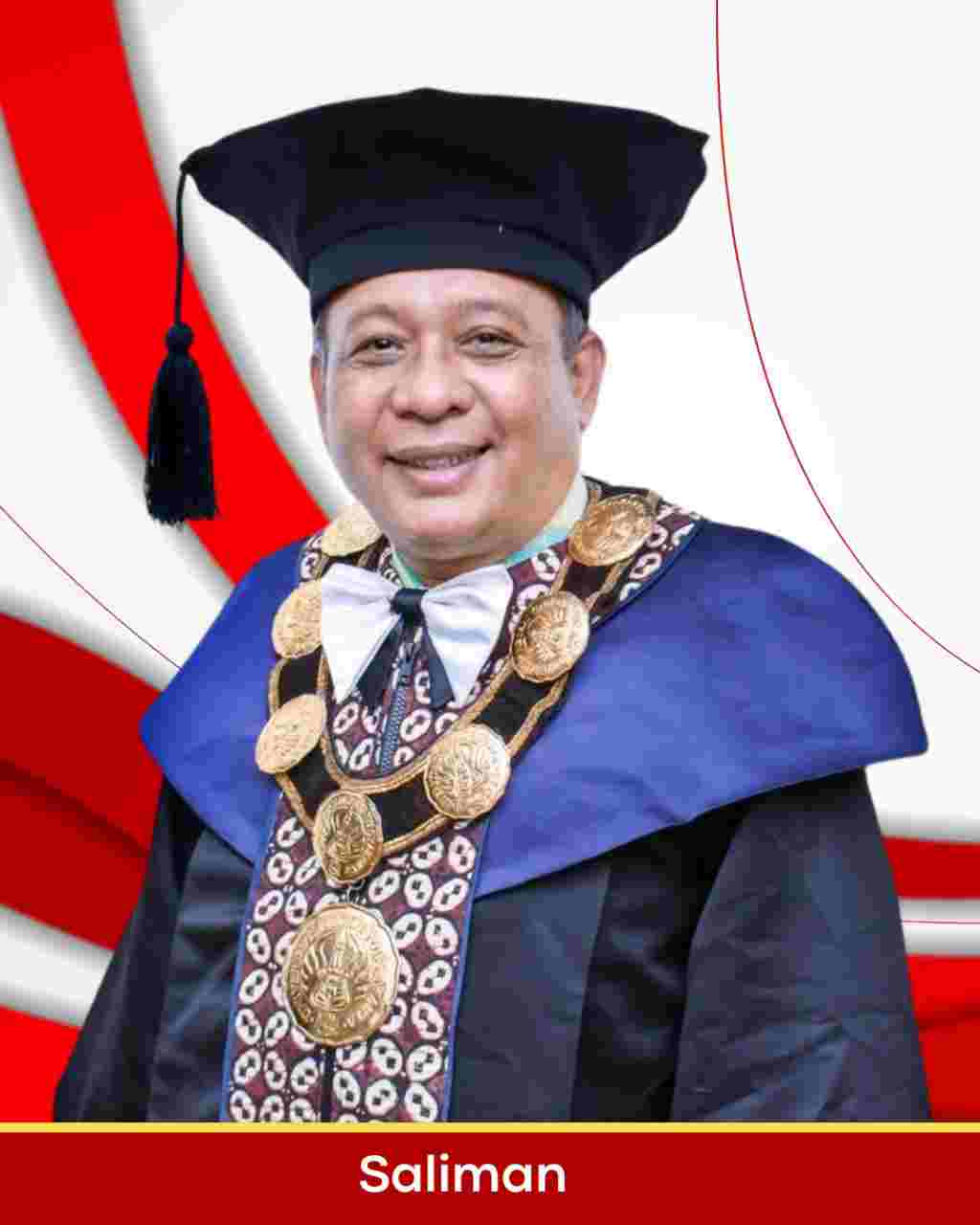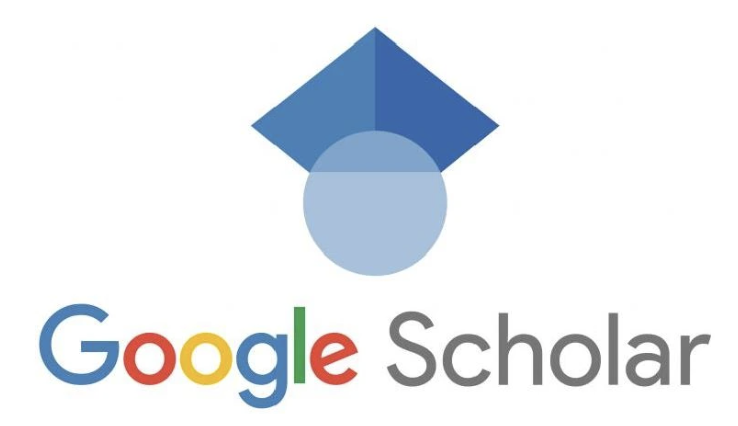The implementation of Science Technology Society Model to improve students environmental literacy
DOI:
https://doi.org/10.21831/jipsindo.v12i1.47000Keywords:
Science community technology, Environmental literacy, Social Studies LearningAbstract
References
Aladwan, F. (2024). The role of psychological immunity in predicting the psychological empowerment level of female kindergarten teachers in Jordan, Journal of Social Studies Educational Research, 15(5), 120-147. https://jsser.org/index.php/jsser/article/view/5677/711
Arikunto, S., Suhardjono, & Supardi. (2007). Penelitian tindakan kelas. Bumi Aksara.
Budiman, B., Supardi, S., & Sudrajat, S. (2023). Enhancing Social Sciences learning effectiveness with a learning management system. Jurnal Kependidikan Penelitian Inovasi Pembelajaran, 7(2), 189-203. doi:https://doi.org/10.21831/jk.v7i2.61782
Dina, A. M., Widiastuti, A., Sudrajat (2024). The role of Social Studies education toward students' readiness in facing globalization: social skills as moderating factor, Jurnal Pendidikan Progresif 14(3), 2005-2025, DOI: http://dx.doi.org/10.23960/jpp.v14.i3.2024136
Lailatussakdiah, Sudrajat, Irfanani, Z. I. (2025). The influence of the learning environment and digital literacy on Social Studies learning outcomes of VIII grade students of Jerowaru State Junior High School, International Journal of Multidisciplinary Research 08(02), 662-669 DOI: https://doi.org/10.47191/ijmra/v8-i02-27
Mufid, S. A. (2010). Ekologi manusia dalam prespektif sektor kehidupan dan ajaran Islam. PT Remaja Rosdakarya.
Muhammad Nur, D., & Zubair, A. (2024). Environmental conservation efforts for disaster mitigation based on local wisdom in Colo Dawe. JIPSINDO (Jurnal Pendidikan Ilmu Pengetahuan Sosial Indonesia), 11(2), 152-170. DOI:https://doi.org/10.21831/jipsindo.v11i2.73241
Poedjiadi, A. (2019). Sains teknologi masyarakat model pembelajaran kontekstual bermuatan nilai. PT Remaja Rosdakarya.
Rusmana, N. E., & Akbar, A. (2017). Pembelajaran ekoliterasi berbasis proyek di sekolah dasar. Jurnal Edukasi Sebelas April, 1(1), 1-12. DOI: https://doi.org/10.25217/ji.v8i2.3731
Siregar, M., Meilanie, S., & Purwanto, A. (2020). Pengenalan ecoliteracy pada anak usia dini melalui metode bercerita. Jurnal Obsesi : Jurnal Pendidikan Anak Usia Dini, 5(1), 719-728. doi:https://doi.org/10.31004/obsesi.v5i1.700
Susanto, A. (2014). Pengembangan pembelajaran IPS di sekolah dasar. Prenadamedia Group.
Tianti, T., Komalasari, K., & Ratmaningsih, N. (2024). Implementation of project-based learning social studies in Independent Curriculum to reduce students' social loafing. JIPSINDO (Jurnal Pendidikan Ilmu Pengetahuan Sosial Indonesia), 11(2), 106-117. doi:https://doi.org/10.21831/jipsindo.v11i2.70758
Widiastuti, A., Mulyani, E., Riani, L., Saputri, A., & Samsudin, N. (2024). Community empowerment strategy based on social entrepreneurship values through village-owned enterprise in Indonesia: The contribution for Social Studies Education. JIPSINDO (Jurnal Pendidikan Ilmu Pengetahuan Sosial Indonesia), 11(2), 194-213. doi:https://doi.org/10.21831/jipsindo.v11i2.76897
Downloads
Published
How to Cite
Issue
Section
Citation Check
License
Authors who publish with this journal agree to the following terms:
- Authors retain copyright and grant the journal right of first publication with the work simultaneously licensed under a Creative Commons Attribution License that allows others to share the work with an acknowledgement of the work's authorship and initial publication in this journal.
- Authors are able to enter into separate, additional contractual arrangements for the non-exclusive distribution of the journal's published version of the work (e.g., post it to an institutional repository or publish it in a book), with an acknowledgement of its initial publication in this journal.
- Authors are permitted and encouraged to post their work online (e.g., in institutional repositories or on their website) prior to and during the submission process, as it can lead to productive exchanges, as well as earlier and greater citation of published work (See The Effect of Open Access).

JIPSINDO (Jurnal Pendidikan Ilmu Pengetahuan Sosial Indonesia) is licensed under a Creative Commons Attribution-ShareAlike 4.0 International License.
Based on a work at https://journal.uny.ac.id/index.php/jipsindo.
















